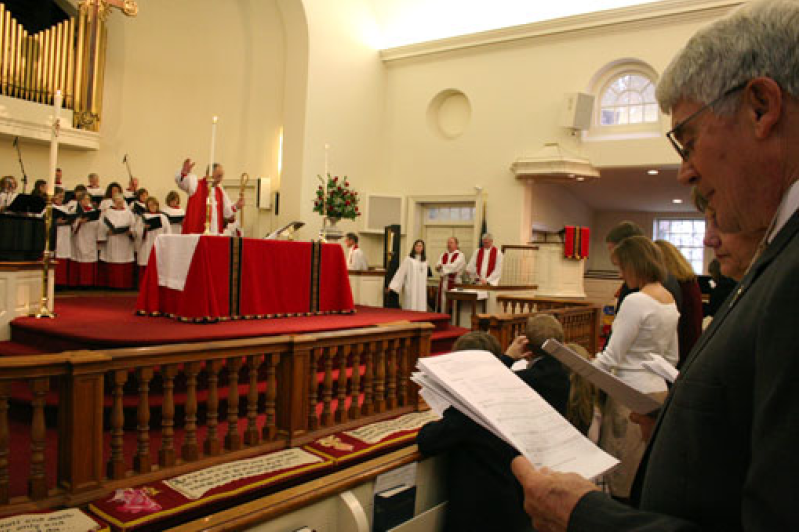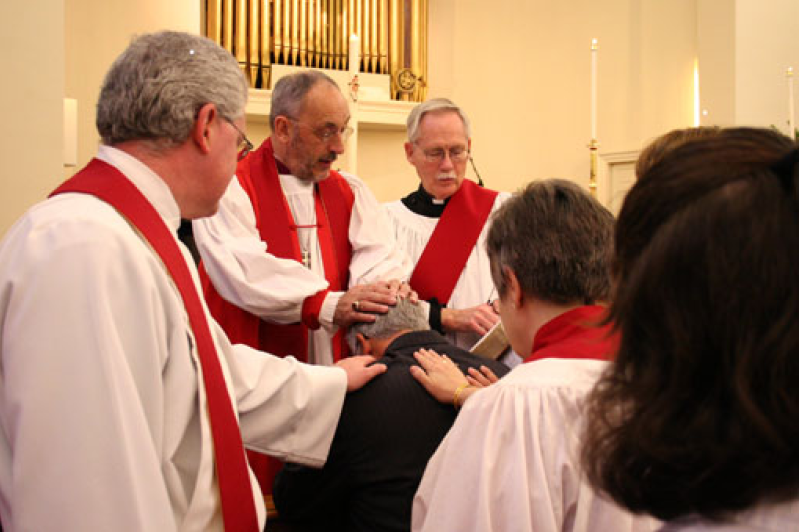

FAIRFAX, Va. – As breakaway Anglicans prepare to introduce a draft constitution for their new conservative province in North America on Wednesday, many within the global church body are debating whether a separate structure is the best way to deal with the current divisions.
For many orthodox Anglicans, it is.
Returning to Truro Church in Fairfax to preach this past Sunday was former rector, or senior pastor, the Rt. Rev. Martyn Minns who has been leading some 80 breakaway congregations in the Convocation of Anglicans in North America (CANA) as missionary bishop.
It has been nearly two years since several prominent congregations in Virginia voted to sever ties with The Episcopal Church, which conservatives say has departed from Christian orthodoxy as well as Anglican tradition. Membership at Truro Church has not been affected much by the disaffiliation and services on Sunday showed the congregation's mission has not been deterred as 16 persons were confirmed for membership.
As such breakaway congregations move forward and like-minded Anglicans are uniting efforts, Minns acknowledged to the hundreds of congregants that the new North American province is forming "far more quickly" than he had expected.
Expediting the establishment of the new body include the votes of now four regional dioceses to leave The Episcopal Church and this past summer's conference in Jerusalem where conservative bishops, many from the Global South, told those in North America to get organized and "get on with it," as Minns noted.
With that, the new structure, which is seen as a rival body to The Episcopal Church – the U.S. arm of Anglicanism – and the Anglican Church of Canada, has drawn criticism, with some saying it will be a cause for more division in the already splintering global Anglican Communion.
But Minns argues that the creation of the new province is in efforts to overcome division – division that's already there, he told The Christian Post.
"Division has been there since 2003 (when The Episcopal Church consecrated its first openly gay bishop). There is a division in the [Anglican] Communion," Minns said. "We're trying to find a way to overcome that and become less divided."
The Very Rev. Robert S. Munday, a priest within The Episcopal Church who has friends in breakaway groups, says the best way to preserve unity "is to allow the American church to divide (which is happening anyway, whether anyone likes it or not) and to recognize two North American provinces," according to his blog. Otherwise, the Communion will be lost, he says.
There are several different breakaway and conservative Anglican groups, representing 100,000 Anglicans, that are coming together to comprise the new province, which may be officially established in the middle of next year.
Although the body is primarily seen as an orthodox alternative to the current national churches in North America, Minns stressed there is still diversity.
"I think what we’re saying is that there’s a theological heart to what we’re doing but there’s a variety there," he explained. "There’s a common set of theological assumptions that unite us but we’re not all jumping out of the same box."
Within The Episcopal Church, however, the diversity was too broad.
"Some pushed the envelope too far and so as a reaction some said we can’t go that far; we need to come out and at least have some definition to what we believe," the CANA bishop said.
Minns labeled the new body as "orthodox, Anglican, mission-minded, biblically-centered."
"I would it's basically a fairly traditional Anglicanism with a passion for mission," he briefly explained.
But without recognition from the Archbishop of Canterbury – the spiritual leader of the Anglican Communion – some say the new province is not keeping with Anglican tradition.
In that sense, Minns, along with several other conservative leaders, are calling for some new structures and hope their efforts will help move the Communion past the colonial era.
"I think part of the problem right now is that the Anglican Church is a global church. It started as an outgrowth of England. But in that sense, I think we’re not post-colonial," Minns noted. "So I think what we’re looking for is a structure that reflects that where there’s genuine authority given to people other than the Archbishop of Canterbury."
"For example, the primate of the Church of Nigeria, there’s 20 million members there," he continued. "It’s a far bigger province than any other province. The idea somehow that he has to ask permission from the Archbishop of Canterbury to do anything is a bit silly. It’s also a bit of the old colonial mindset."
"We’re an international church and yet right now the leadership still looks like the old British Empire. So that needs to change."
Minns will join leaders of the Common Cause Partnership, a federation representing more than 100,000 Anglican Christians in North America, at Wheaton Evangelical Free Church in Wheaton, Ill., on Dec. 3 to unveil the draft constitution for the new province and to also reaffirm biblical truth and Anglican tradition.







